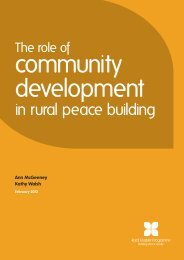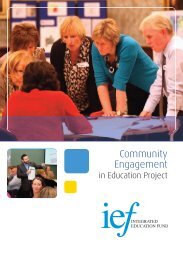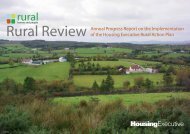Churches
Churches and faith based organisations - Rural Community Network
Churches and faith based organisations - Rural Community Network
- No tags were found...
You also want an ePaper? Increase the reach of your titles
YUMPU automatically turns print PDFs into web optimized ePapers that Google loves.
Some churches that do wish to establish<br />
relationships with each other participate in<br />
ecumenical events, like carol services, which<br />
are perceived by the more conservative<br />
evangelical churches as ‘worshipping’ together.<br />
However, through my work in the town of<br />
Newtownards, research by Macaulay<br />
Associates into ‘The relationship that exists<br />
between churches and between churches and<br />
the local community’, it was discovered that a<br />
larger percentage of churches would work<br />
together for community, civic and social benefit<br />
than would meet together for what was<br />
perceived as joint worship. In Newtownards,<br />
there was a Good Friday service in the Town<br />
Square, a Carol Service at Christmas and<br />
participation at the Cenotaph Service in<br />
November. A number of Protestant churches<br />
would participate in no human engagement as a<br />
church with the Catholic Church, nor even with<br />
other denominations, which were considered<br />
too liberal in their theology.<br />
The second issue is that many church fora<br />
which have come together in towns across<br />
Northern Ireland to seek to model good<br />
relationships have had little impact on the nonchurch<br />
going population of their town who know<br />
little of church life, politics nor denominational<br />
nuances. In an ever increasing secular society,<br />
church activities which merely enable church<br />
members to meet and learn more of each other<br />
have had little impact on community<br />
development. The churches in the main have<br />
focused their learning internally to find out about<br />
the denominational difference and similarities<br />
and are still relatively ignorant of the needs of<br />
those who are disadvantaged. Indeed, in many<br />
instances, people from local Protestant<br />
congregations with a heart for peace in<br />
Northern Ireland and with the best of intentions<br />
have sought to reach out their hand to their<br />
Catholic neighbour but have found it much more<br />
difficult to reach their hand out to their<br />
disadvantaged neighbour in the loyalist estate<br />
next door to their church.<br />
So another issue is highlighted and that is one<br />
of lack of knowledge and skill. If you have no<br />
relationship with people from a more<br />
disadvantaged community, you will have little<br />
knowledge of the specific issues and problems<br />
faced by them. Where there is a lack of<br />
understanding of the complex issues that make<br />
up poverty and the cycle of poverty, which holds<br />
someone in its grasp, it is difficult to do anything<br />
about it.<br />
Alongside this lack of knowledge is a lack of<br />
understanding of community development and a<br />
slightly distorted understanding of the<br />
servanthood that is taught in the bible. The<br />
church often tries to help people, once again<br />
with the best of intentions, but in a way that is<br />
often perceived as patronising. It does things for<br />
people rather than enabling people to develop<br />
the skills to do things for themselves. This<br />
approach stops people feeling that they have<br />
any value or worth and also, when the help<br />
stops, leaves those in need back at square one.<br />
An example of this would be the big Streetreach<br />
Programme that often sends young people into<br />
disadvantaged communities to clean their<br />
streets. The young people involved are often<br />
only there for a few days or a week - little time<br />
to establish relationships. Rarely are the<br />
communities asked what they would like help<br />
with and, in some circumstances, members of<br />
communities have been angry that people seem<br />
to think their community needs cleaned up in<br />
the first place. The churches need to develop a<br />
theological understanding of community<br />
development and why it is a more Christian way<br />
of supporting those in need. Building the God<br />
given gifts and skills of individuals makes them<br />
feel valuable again and worth something in life<br />
and gives a hope for the future so they can<br />
continue to move forward.<br />
<strong>Churches</strong> and faith based organisations<br />
15








